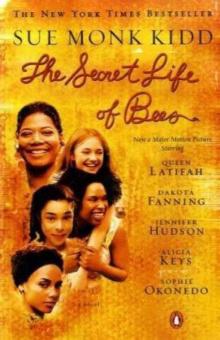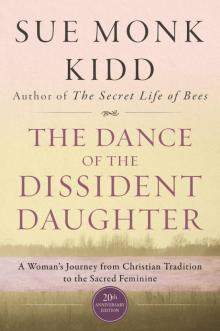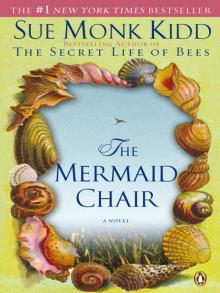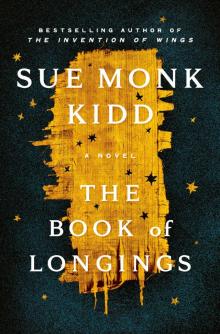- Home
- Sue Monk Kidd
The Book of Longings Page 15
The Book of Longings Read online
Page 15
Yaltha removed her bridle. “One would think a two-headed sheep had arrived in your midst!”
I winced. “Greet my aunt Yaltha.”
Jesus grinned.
“She’s impertinent,” James said to Jesus, as if she wasn’t standing there.
Rankled, I said, “It’s what makes her so dear to me.”
Jesus, I would discover, was a peacemaker and a provocateur in equal measures, but one could never say which he would be at any given moment. In this moment he became the peacemaker. “You’re welcome here. Both of you. You are our family now.”
“You are indeed,” Mary said.
Judith remained silent, as did Jesus’s brothers. My aunt’s honesty had laid the friction bare.
* * *
• • •
WHEN THE CART WAS UNPACKED, I bid Lavi goodbye. “I will miss you, friend,” I told him.
“Be well,” he said, and his eyes watered, causing mine to do the same. I watched him lead the horse through the gate, listening to the clatter of the empty wagon.
When I turned back, the family had dispersed. Only Yaltha and Jesus stood there. He took my hand and the world righted herself.
We were to marry that same day when the sun set, but without ceremony. There would be no procession. No virgins raising their oil lamps and calling out for the groom. No singing, no feasting. By law, a marriage was the act of sexual union, nothing more and nothing less. We would become husband and wife in the solitude of each other’s arms.
Not allowed to enter the chuppah beforehand, I spent the afternoon in the storeroom, where Yaltha had spread her bed mat. Mary had offered to share her room with Yaltha, but she’d declined, preferring to be on her own amid storage jars, food provisions, wool shares, and tools.
“Do they think we have the spaciousness of a palace?” I said when we were alone, mimicking my soon-to-be sister-in-law.
Yaltha said, “She’s impertinent!” mocking James’s assessment of her.
We fell upon each other laughing. I put my finger to my lips. “Shhhh, we’ll be heard.”
“Am I required to be well behaved and quiet?”
“Never,” I replied.
I began to meander about the little room, touching the tools, running my thumb across a stained dye vat. “Are you worried about entering the chuppah?” Yaltha asked.
I supposed I was—what girl wasn’t nervous her first time?—but I shook my head. “As long as I don’t conceive, I will welcome it.”
“Welcome it then, for you will have no worries there.”
Yaltha had procured blackseed oil for me from a midwife in Sepphoris, a foul liquid more potent than anything my mother had used. I’d been swallowing it for a week. We’d agreed she would conceal it here among her things. Most men knew nothing of the ways in which women avoided pregnancy. When it came to children, they didn’t much consider the agony of birth and the possibility of death; they thought instead of God’s mandate to be fruitful and multiply. It seemed to be a command God had devised with men in mind, and it was the only one they were universally good at obeying. I didn’t think Jesus was like other men, but I’d determined for now to keep the blackseed oil to myself.
When it was time, I dressed in a dark blue tunic that my aunt pronounced bluer than the Nile. She smoothed out the wrinkles with her hands and placed the silver headband on my forehead. I draped a white linen shawl over my head.
At exactly sunset, I entered the chuppah, where Jesus waited. Stepping inside the mud-walled room, I was greeted by the smell of clay and cinnamon and a dim miasma pierced with a beam of orange light falling from a high window.
“This will be our abode,” Jesus said, stepping back with a sweep of his arm. He wore his blue-tasseled cloak. His hair was damp from washing.
The room had been arranged with care—whether by Jesus or by the women, I didn’t know. My red rugs had been spread across the dirt floor. Two bed mats lay side by side, sprinkled with ground cinnamon—one freshly woven. My mirror, comb, and a neat stack of my clothes had been placed on a bench, with my chest of cedar set into a corner. My incantation bowl sat on a small oak table beneath the window for all the world to see, so exposed I had an irrational urge to hide it somewhere, but I forced myself to remain still. I said, “If you inspected my bowl, I’m sure you saw the graven image inside it. I drew it myself.”
“Yes, I saw,” he answered.
I watched for traces of condemnation on his face. “It doesn’t offend you?”
“I’m more concerned with what’s in your heart than what’s in your bowl.”
“To look into the bowl is to see into my heart.”
He walked over and peered into it. Could he read Greek? Taking the bowl in his hands, he turned it as he read aloud, “Lord our God, hear my prayer, the prayer of my heart.” Looking up, he held my gaze a moment before continuing. “Bless the largeness inside me, no matter how I fear it. Bless my reed pens and my inks. Bless the words I write. May they be beautiful in your sight. May they be visible to eyes not yet born. When I am dust, sing these words over my bones: she was a voice.”
He set the bowl back on the table and smiled at me, and I felt the unbearable ache of loving him. I went to him, and there on the thin straw mats in the crumbles of light, I knew my husband and he knew me.
ii.
The morning after I became his wife, I woke to hear him repeating the Shema and then a woman’s voice in the courtyard calling, “Ana, it’s time to milk the goat.”
“Hear, O Israel: The Lord our God is one Lord,” Jesus intoned.
“Can you hear me?” the voice called. “The goat is in need of milking.”
“And you shall love the Lord your God with all your heart, and with all your soul, and with all your might.”
“Ana, the goat.”
I lay still, eyeing Jesus across the room, ignoring the urgent need for goat milk, listening to his voice rise and fall, the quiet song of it. Somehow in my privileged ignorance it hadn’t occurred to me that I would be given an equal share of the chores. The thought was faintly alarming—I’d arrived here unskilled at every conceivable task assigned to women.
Jesus faced the window, his back to me. When he lifted his palms, I glimpsed his arms ripple beneath his tunic. The sight summoned forth the memory of last night, moments so innermost and beautiful, they caused an exquisite ache inside me. I let out an involuntary moan, and he finished his prayer and came to sit on the mat beside me.
He said, “Do you always sleep so late?”
I propped on my elbow, tilting my face to his, and tried to look both coy and innocent. “It’s not my fault. I was kept awake last night.”
His laughter rebounded from the walls to the ceiling, then out through the little window. Pushing the mass and tangle of hair from my face, he drew me against his chest. “Ana, Ana, you have awakened me and made me alive.”
“And you have done the same to me,” I said. “I have only one fear in being here.”
He cocked his head. “And what is that?”
“I have no idea how to milk a goat.”
He laughed his uproarious laugh once more and pulled me to my feet. “Get dressed and I will show you. The first thing you must learn is that this is a very particular goat. She only eats winter figs, almond blossoms, and barley cakes, and insists on being fed by hand and having her ears scratched . . .”
He carried on like this while I slipped a tunic over my undergarment and tied a scarf around my head, giggling at him under my breath. He was still traveling to Sepphoris to work on the theater and it seemed he should’ve been on his way by now, but he appeared to be in no hurry.
“Wait,” I said as he started toward the door. Opening my chest, I retrieved a small pouch, from which I pulled the red thread. “Can you guess where I acquired this?”
His brow wrinkled.
“It f
ell from your sleeve the day we met in the market,” I said.
“And you kept it?”
“I did, and I shall wear it every day while you’re away.” I held out my arm. “Tie it on for me.”
As he wrapped it about my wrist, he returned to his teasing. “Am I so faint in your thoughts that when I’m away you need this reminder?”
“Without this thread, I would forget I had a husband altogether.”
“Then keep it close,” he said and kissed my cheeks.
We found Judith in the stable. The goat was standing defiantly in the water trough, daring the sheep to drink. She was a dainty creature with a white body, a black face, a white beard, and wide-spaced eyes, one of which rotated in and the other out. I thought her outrageously funny-looking.
“She is a menace!” Judith said.
“I find her endearing,” I replied.
My sister-in-law made a derisive noise. “Then you won’t mind inheriting her care.”
“I don’t mind,” I said. “But I need instruction.”
Sighing, she looked at Jesus as if they might commiserate together over my stupidity.
He took my hand, letting his thumb rub against the thread. “I should go. As it is, I’ll have to walk at a quick pace so as not to be late.”
“Your mother has packed your meal,” Judith told him, glancing accusingly at me, and I realized that task, too, belonged to me. I’d never cooked anything but ink.
When he left us, Judith lifted the goat from the water trough, provoking kicks, bleats, and a splatter of water, and dropped her roughly onto the ground. I watched as the animal lowered her head and butted Judith’s thigh.
Already I felt an affinity with the creature.
* * *
• • •
DURING THOSE FIRST MONTHS it was plain to everyone, including me, that I’d spent my life as a pampered rich girl. Yaltha was of little help—she’d read Socrates, but knew nothing about pounding grain into flour or drying flax. Jesus’s mother gathered me under her wing, trying to teach me, and protected me as best she could from Judith’s reproaches, which gurgled like an unceasing spring: I didn’t light the dung fire correctly. I left chaff in the wheat. I left wool on the sheep. I could not cook pottage without scorching the lentils. My goat cheese tasted like hooves.
Judith complained of me even more vociferously when others were about, notably my husband, telling him once that I was less useful than a lame camel. She not only disparaged my domestic skills, but I half suspected her of efforts to disrupt them. When it was my turn to pound the wheat, the pestle went missing. When I laid the fire, oddly, the dung was wet. Once when Mary instructed me to latch the gate, it miraculously unlatched itself and the chickens escaped.
The only task I excelled at was caring for the goat, whom I named Delilah. I fed her fruit and cucumbers and brought her a little basket that she liked to toss about with her head. I talked to her—Hello, girl, do you have milk for me today? . . . Are you hungry? . . . Do you want your ears scratched? . . . Do you find Judith as annoying as I do?—and she occasionally responded with a string of bleats. Some days, I tied a piece of rope about her neck and fastened it to my girdle and she accompanied me as I went about my chores and waited for the sun to slope toward the hills and Jesus to return. At the sight of him, Delilah and I would rush to the gate, where I embraced him, oblivious to the stares of his family.
James and Simon took fun in mocking our devotion, which Jesus took in stride, laughing with them. There was truth in their teasing, but I didn’t find it as good-natured as my husband. They taunted him out of jealousy. Simon, two years from having a wife, was eager for the intimacies of marriage, and James and Judith’s union was like that of two yoked oxen.
iii.
One hot day in the month of Elul, while the courtyard baked, I milked Delilah in the stable, then placed the ewer of frothy milk outside the gate, where the sheep couldn’t capsize it. When I turned back, Delilah was in the water trough again. She’d taken to standing and sometimes sitting in it for long periods. I made no effort to deter her. I thought of climbing in myself. As Mary approached us with a basket of grain, however, I tried to lure her out.
“Leave her,” she said, chuckling. She looked tired and flush with heat. Now that Judith’s time was near, we’d taken over her portion of the chores, the bulk of which fell to Mary, since I was still an apprentice.
I took the basket from her. Even I could toss grain to chickens.
She leaned against the gate. “Do you know what we should do, Ana? Just the two of us? We should go to the village mikvah and immerse ourselves. Yaltha can remain here with Judith in case the baby decides to come.”
I gestured at Delilah. “I know, I envy her, too.”
She laughed. “Let’s shirk our work and go.” A lovely impish light had come into her eyes.
* * *
• • •
A LINE OF WOMEN had formed outside the stone enclosure that housed the pool, not because they’d suddenly grown devout, but because, like us, they craved a respite from the heat. We joined it, clutching our drying rags and clean tunics. Mary called out a greeting to the toothless old midwife who would soon attend Judith, and was greeted in return, but without enthusiasm. The women ahead of us stole glances at me, whispering and holding themselves stiffly, and I realized that my ill repute had followed me from Sepphoris. I couldn’t tell if Mary noticed or if, for my sake, she pretended not to.
When we stepped inside the cool dwelling and descended into the mikvah, the women’s undertones grew louder. Yes, it’s the chief scribe’s daughter, the one sent away for promiscuity. . . . They say she was nearly stoned for thievery. . . . What reason could Mary’s son have for marrying her? Overhearing their gossip, the women behind us, including the midwife, refused to enter the water after me, preferring to wait until I’d vacated.
My cheeks stung with humiliation. Not because I cared what this puerile gaggle of women thought but because Mary had witnessed the indignities. “Pay them no mind,” she told me. “Turn the other cheek.” But the lovely light had gone from her eyes.
As we walked home, she said, “Jesus and I have also been the recipients of this kind of malice. They called me promiscuous, too. They said Jesus was conceived before my marriage and some said he didn’t belong to Joseph.”
I didn’t tell her Jesus had spoken to me of these things. I waited for her to refute their accusations, but she said nothing, refusing to defend herself.
She took my hand as we walked and I felt how difficult, how bold, how loving it was for her to bare herself to me like this. “Jesus suffered more than I,” she said. “He was branded as a child who was born outside of marriage. Some in the village shun him to this day. As a boy, he would come home from synagogue school with bruises and scrapes, always getting into a fight with his tormentors. I told him what I told you, ‘Pay them no mind and turn the other cheek. Their hearts are boulders and their heads are straw.’”
“I’ve heard Jesus use those same words.”
“He learned well, and his suffering didn’t harden him. It’s always a marvel when one’s pain doesn’t settle into bitterness, but brings forth kindness instead.”
“I think the marvel has a lot to do with his mother,” I told her.
She patted my arm and turned her concern back to me. “I know you suffer, too, Ana, not just from gossip and scandal, but daily at the hands of Judith. I’m sorry she makes it difficult for you.”
“I can do nothing right in her eyes.”
“She envies your happiness.” Abruptly, she guided us off the path to a fig tree and motioned for me to sit in the green shade. “There’s a story I must tell you,” she said. “Last year, when Jesus was close to twenty, well before you came along, Joseph attempted to betroth him. My husband was ailing then—weak and short of breath with a blue hue about his mouth.” She paused, c
losing her eyes, and I saw the freshness of her grief. “I think he knew he would die soon, and it spurred him to fulfill his duty and find his first son a wife.”
A memory stirred. That evening Jesus had asked me to become his betrothed, he’d said his father had tried to arrange a marriage for him, but he hadn’t agreed to it.
“Judith’s father, Uriah, owns a small parcel of land and keeps sheep, even hiring two shepherds,” Mary said. “He was a friend to Joseph, one who paid no attention to lingering stories of Jesus’s birth. Joseph intended to seek a betrothal for Jesus with Judith.”
The revelation dazed me.
“Of course, it never happened,” she continued. “Our son had some notion he wouldn’t marry at all. That was a great shock to us. Not to marry would’ve made him even more of a pariah. We pleaded with him, but his reason had to do with God’s wishes, and he asked his father not to approach Uriah. Joseph complied.”
The sunlight broke through the limbs and I frowned, more from confusion than the glare. “Why should Judith be envious of me if she knows nothing about this?”
“But she does know. Joseph had been so assured of the betrothal, he had already hinted his intention to Uriah. Judith’s mother came to me, saying her daughter was pleased at the notion. Joseph, poor man. He felt to blame and was relieved when James offered to betroth Judith instead. James was barely nineteen, so young. Naturally, the story spread throughout Nazareth.”
How embarrassed Judith must’ve been—getting the second-born because the firstborn declined. How hard it must have been for her to see me ride through the gate only months later.
“Jesus believed his decision was right,” Mary was saying. “Still, he felt sorry for the shame it caused Judith’s family and he went to Uriah and humbled himself, saying he meant no disrespect, that he was uncertain if he would marry at all, that he still wrestled with God over it. He praised Judith as worthy, her price far above rubies. This satisfied Uriah.”

 The Secret Life of Bees
The Secret Life of Bees The Invention of Wings
The Invention of Wings Traveling With Pomegranates
Traveling With Pomegranates The Dance of the Dissident Daughter
The Dance of the Dissident Daughter The Mermaid Chair
The Mermaid Chair The Book of Longings
The Book of Longings The Invention of Wings: A Novel
The Invention of Wings: A Novel The Invention of Wings: With Notes
The Invention of Wings: With Notes